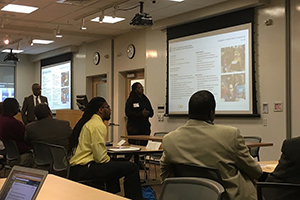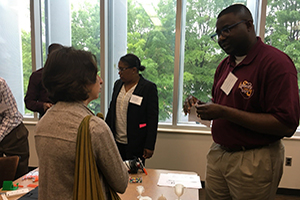Using NICs to Engage More Minority Males in STEM Learning


Last month, I had the privilege of participating in the Building a Networked Improvement Community Around Engaging Minority Males in STEM Workshop at Morgan State University. The workshop focused on advancing the work of the Early STEM Engagement for Minority Males (eSEM) Initiative, a network of 16 minority-serving institutions (MSIs).
Led by Morgan State and in partnership with Verizon Innovative Learning Programs, SRI Education, the National CARES Mentoring Network, and local school districts, eSEM is a growing collaborative seeking to address STEM achievement challenges and improve outcomes for middle school minority male students through the development of a Networked Improvement Community (NIC). The initiative is supported through grants from the National Science Foundation and includes the following universities:
- Cohort 1: Jackson State University; Kentucky State University; Morgan State University; North Carolina A&T University
- Cohort 2: California State University, San Bernardino; Central State University; Clark Atlanta University; Delaware State University; Hampton University; Harris Stowe State University; Texas Southern University; University of the District of Columbia
- Cohort 3: California State University, Los Angeles; Dillard University; Florida International University; Tennessee State University
eSEM’s vision centers around a collective-impact approach and utilizing improvement science to improve male minority access to high-quality education in science, technology, engineering, and math (STEM) subjects. A variety of partners, experts in both STEM learning and NIC processes, participated in the workshop to share best practices to inform the development of a NIC. I was invited on behalf of the AACTE Black and Hispanic/Latino Male Teacher Initiative NIC to share the group’s experiences and findings as an example of utilizing the Carnegie Foundation for the Advancement of Teaching’s improvement science model to address a persistent problem of practice.
During the workshop, several roadblocks experienced by minority males were identified, including disparities in the availability of high-quality STEM educational resources, a lack of role models, and a shortage of minority STEM educators. Discussions about this shortage facilitated an exploration of teacher preparation as a lever for addressing many of the other challenges noted and underscored the importance of increasing the recruitment and retention of teachers of color as vital to engaging PK-12 students to enter the STEM professions.
The workshop provided an invaluable opportunity for educators and their partners to share ideas and develop priorities to better engage minority males in STEM. Drawing upon these discussions, eSEM institutions will be working further to establish a NIC focused on these goals.
Additional information about eSEM can be found here as well as in the 2017 STEM for All Video Showcase. Click here and here to access past blogs about the AACTE Black and Hispanic/Latino Male Teacher Initiative NIC, and visit the AACTE Resource Library to view webinars highlighting the work of selected AACTE NIC participants. A full overview of the AACTE NIC’s work and experiences will also be shared through a conceptual framework paper that will be released later in 2017.


Tags: AACTE in the community, AACTE partner organizations, community engagement, diversity, research, school-university partnerships, secondary education, STEM, technology, workforce development






